#parole lawyers in California
Explore tagged Tumblr posts
Text
Non-Violent Parole Hearing Lawyer: Guidance for Your Case
Navigating the legal system during a parole hearing can be an overwhelming experience, especially for individuals seeking a second chance through non-violent parole reviews. Ensuring your case is presented effectively requires the expertise of a knowledgeable attorney who understands the nuances of California's parole process. A professional legal representative can significantly enhance your chances of success in these hearings.

Understanding Non-Violent Parole Hearings
Non-violent parole hearings are designed for incarcerated individuals convicted of non-violent offenses to present their case for early release. These hearings follow specific guidelines, including assessing behavior during incarceration, rehabilitation efforts, and readiness for reintegration into society. The process requires in-depth preparation, from filing necessary documentation to presenting compelling arguments. Having legal representation is critical to navigating these requirements effectively.
The Role of a Non-violent parole hearing attorney
An experienced attorney plays a pivotal role in preparing for a Non-violent parole hearing attorney. From gathering supporting evidence to articulating a solid case strategy, an attorney ensures that every aspect of your case is well-documented and presented. They also help anticipate potential challenges, such as objections from the parole board or opposition from prosecutors, by providing counterarguments grounded in legal precedents. This guidance not only boosts your confidence but also ensures that the parole board receives a complete and accurate representation of your case.

Why Choose a Specialized Lawyer?
A specialized non-violent parole hearing lawyer brings a wealth of experience to the table. Their familiarity with parole board procedures and the specific criteria used to evaluate parole eligibility ensures that nothing is left to chance. They provide tailored advice based on your unique circumstances, helping you present a case that highlights your rehabilitation efforts and potential contributions to society post-release.
Reviewing Your Case with a Professional
Every parole hearing is unique, and a review by a non-violent parole review attorney ensures that all details are thoroughly examined. They can identify weaknesses in your application, address potential issues, and offer guidance on how to strengthen your case. From reviewing conduct records to gathering testimonials, a skilled attorney helps craft a narrative that aligns with the parole board's expectations, maximizing your chances of success.
Securing parole is a significant step toward rebuilding your life, and proper legal guidance can make all the difference. Partnering with an experienced professional ensures that your case is prepared and presented with the utmost care and expertise. If you’re preparing for a non-violent parole hearing, trust the dedicated team at CalParoleLawyer to support you every step of the way. Their commitment to justice and rehabilitation ensures that you have the best chance at a successful outcome.
#non violent second strike parole attorney#non violent second strike parole lawyer#Non-Violent Parole Hearings#Non-violent parole hearing attorney#non-violent parole hearing lawyer#non-violent parole review attorney#california criminal defence lawyers#california criminal defense attorney#parole lawyers in california#california civil rights lawyer#california criminal defense lawyers
0 notes
Text
Youthful Offender Parole Attorney, California Youthful Offender Parole Expert representation before the Youthful Offender Parole Board. We specialize in navigating the parole process for young offenders, advocating for early release and ensuring a fair, compassionate review of their cases.
#california youthful offender parole lawyer#best california lawyer#california criminal defense attorney#california criminal defense lawyers
0 notes
Note
I'm seeing a worrying amount of idiots on tumblr dot com push that "Kamala hates trans women" and I am losing my mind at how they are pushing it, constantly, saying she is a proven transmisogynist, despite it being a complete lie and her actively working behind the scenes to help trans women in prison. Is there like, sources that could help debunk this shit because I'm at my wits end as these people scream and cry and vomit trying to get biden to drop out but then are like "eghhhh still don't wanna vote for a transphobic cop..." when she's NEITHER-
Isn't the internet wonderful? first rule NEVER examine your priors! ALWAYS! hang onto whatever the first hot take you had on a subject to THE DEATH!
"Kamala is Transphobic!" over here in reality
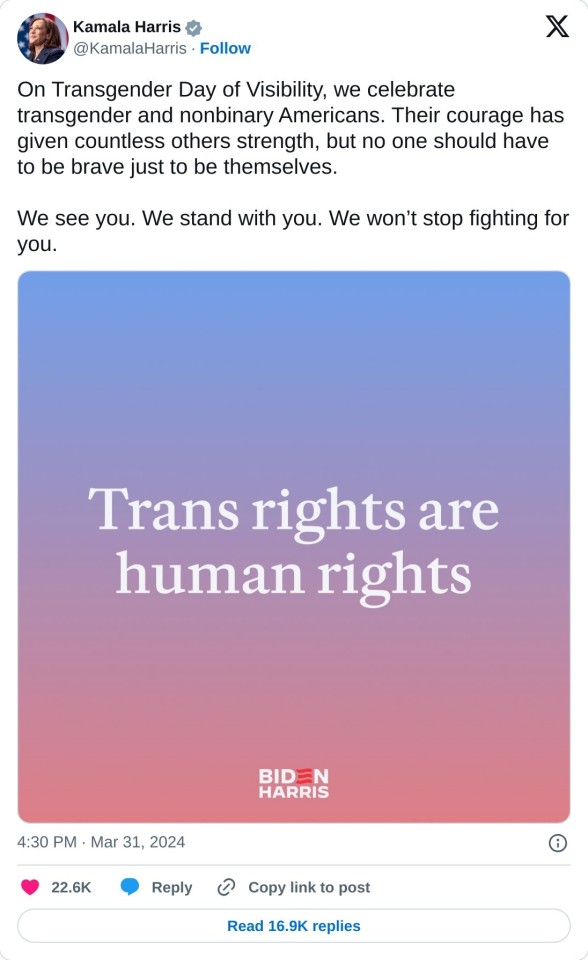
past that trans and LGBT rights groups have been quick to endorse her like
Advocates for Trans Equality
Human Rights Campaign
just today 1,100 LGBT celebrities, lawmakers and leaders endorsed her
“The intersection on the issue of reproductive care and trans care, and the ability of families to be able to have care for their children and their families, is really, again, an intersection around attacks that are on an identity,” -Vice-President Harris, 2023
any ways the root of the idea she's transphobic comes from one case in 2015. Two inmates in the California State Prison system sued to get GRS, which as inmates would have been covered by the Prison system. It's worth noting here, both women got what they wanted, one was paroled and got the surgery covered by California Medicare while the other serving a life sentence was ultimately covered by the prison system.
Two things are important to bear in mind here, 1. Part of the job of California Attorneys General is to defend the state when it is sued, thats the job, 2. It seems early on in the case Harris was not personally aware of it, about 1,000 lawyers work in the Cali AG's office and so the AG cannot be personally aware of every case, and check this quote from the Lambda Legal lawyer handling the case:
“The California AG’s office shifted its handling of these cases significantly after now-Sen. Harris took over,” Renn said. “Initially there was language in briefing for the state that glaringly misunderstood the medical necessity of transition-related medical care and was patently offensive. But then, there was a dramatic change, which seems to have gone along with important policy shifts.”
Link
in 2019 Harris talked about the case and working after it was settled to change the policy of the California State Prison system
"When that case came up, I had clients, and one of them was the California Department of Corrections. It was their policy. When I learned about what they were doing, behind the scenes, I got them to change the policy," Harris said.
"I commit to you that always in these systems there are going to be these things that these agencies do. And I will commit myself, as I always have, to dealing with it," Harris said.
Any ways Harris can consistently spoken out for and supported Trans people, banned the hateful Trans panic defense when she was AG, in the Senate supported the Equality Act, during her 2020 campaign for President she drew attention to the hate crimes against black trans women while holding herself accountable for the 2015 case. As Vice-President she drew fire voicing support for Dylan Mulvaney during the hellish Bud Light backlash. Her Husband Doug was tapped to host the first ever White House Trans Day of Remembrance
basically you're looking at a great ally who clearly supports trans rights, who was involved in a case, which involved two people who got the surgeries they were looking for paid for by the State of California, close to 10 years ago now, there's evidence that both she moved the case in a better direction when she took over it and also that she changed the polices of the state to before more gender affirming.
#kamala harris#election 2024#Trans#trans rights#trans equality#us politics#american politics#politics#misinformation
2K notes
·
View notes
Text
39 notes
·
View notes
Photo


On the day before his father Jeff Hall was murdered, 10-year-old Joseph Hall showed a visitor a leather belt with an SS emblem and proudly said, "Look what my dad got me." Little did anyone know, the following day, Joseph would be the one to kill his father.
Jeff dedicated his life to the National Socialist Movement, the country's largest neo-Nazi party, and led a chapter in his hometown of Riverside, California. He held hate-fueled rallies outside synagogues, filled with members of the Ku Klux Klan and neo-Nazis. Due to the economic downturn in the construction industry, Jeff struggled to find a job and blamed Jews and people of color for his inability to work.
Growing up in such a hateful and abusive environment, it's no surprise that Joseph was a troubled child. He was expelled from several schools for attacking his teachers and was homeschooled by his racist father, who held monthly meetings that were a mix of Nazi propaganda and party games. Jeff frequently bragged about teaching Joseph how to shoot a gun.
On May 1, 2011, Joseph grabbed a .357 revolver from the closet shelf and shot his sleeping father in the head. He told investigators that he did it because his father had threatened to remove the fire alarms from their home and set it on fire while they slept. During the trial, Joseph's defense lawyer argued that he was a victim of his father's racism and violent upbringing.
Joseph was found responsible for his father's murder and sent to a juvenile detention center. He has attended classes and therapy and reportedly made significant progress.
However, the conviction has been controversial, with advocates arguing that a 10-year-old child couldn't fully comprehend the seriousness of his actions. Nonetheless, Joseph is eligible for parole when he turns 20. The prosecutor who convicted him even grew attached to Joseph, saying that he knew the rules and was treated with dignity.
79 notes
·
View notes
Text
The Torture and Murder of Hanja Piller
In 1962, a Hungarian doctor who was infested with rage, jealousy, and insecurities, committed one of the cruelest crimes you could imagine against his own wife.
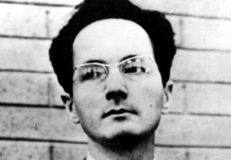
Geza de Kaplany was a Hungarian born doctor who emigrated to the United States in the early 1950s. He was raised in a very wealthy family, and had a father who was physically abusive. So abusive that Geza lost sight in one of his eyes during a beating. Geza ended up attending University of Szeged to study medicine, and graduated with honors in 1951. He originally practiced in Budapest as a cardiologist, but had problems with officials in the Hungarian Revolution of 1956, and fled Hungary. He then visited England and Denmark and wrote a book called “Doctor In Revolt,” about his experiences in Hungary as a freedom fighter. He then decided to settle in Boston to continue his practice, but found out that his degree wasn’t recognized. He ended up retraining as an anesthesiologist and interned at a hospital in Milwaukee from August 1957 to August 1958. Afterwards he attended Harvard and taught anesthesiology at Yale. Then he decided to move to San Jose, California, and worked at San Jose Hospital.
In June of 196, he met his wife, Hanja Piller, who was also from Hungary. She was 25 and a former model, a beauty queen, and a showgirl at Bimbo’s 365 Club. They had a very spicy relationship and ended up marrying in August. However, just a few weeks after their wedding, Geza was informed by a friend that his new wife has been having an affair.
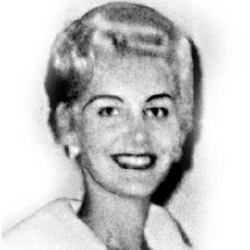
He came up with a plan to destroy her beauty and on the evening of August 28th, 1962, he carried out his plan. He tied her up to their bed and put on loud music to muffle her screams, and started to disfigure her face and body with a scalpel. He then poured a mixture of hydrochloric, sulfuric and nitric acid into the cuts, causing her to suffer third degree corrosive burns over most of the front of her body. After three hours, the police were called. Some sources say he called the police himself, while other sources claim the neighbors called the police due to the noise. When the police arrived, he explained to them that his plan was not to kill her, but to simply destroy her beauty. Sadly, Hanja spent 33 days in the hospital before she died of her injuries. Her body was so badly burned, that when paramedics tried to handle her body, they burned their hands.
His trial took place on January 9th, 1963, and was originally charged with attempted murder, but was later changed to murder by torture after his wife died. He pleaded not guilty by reason of insanity, and his lawyer claimed that he had multiple personality disorder and stated that this crime wasn’t committed by him, but instead it was his alter ego, “Pierre de la Roche.” The prosecutors brought a witness to the stand, an old lover of Geza’s who said otherwise. He was declared legally sane, but medically insane. He was sentenced to life in prison, and the jury assumed that he would be considered a special interest prisoner, and wouldn’t be allowed out. Unfortunately, they were wrong.
In 1975, he was paroled in a controversial decision marked by accusations that postmortem photographs of his victim were removed from his file by the chairman of the California state parole authority for men, prior to review of his case by the parole board. Therefore, the ability to be paroled while under the sentence of life imprisonment was removed. The parole board allowed him to travel to Taiwan in November of 1975, to work as a medical missionary doctor serving poor patients in a Catholic hospital in Lutsao. He left the United States before his prosecutors and the general public knew he had been paroled. Negative public reaction followed. Geza worked at the Lutsao clinic for the next four years, and eventually remarried. He became tired of the constant parole checks, and left Taiwan in late 1979 and went off the grid. When California corrections officials discovered he was missing, a warrant was issued for his arrest. However, a 2002 investigation indicated that California officials were made aware of his whereabouts several times over the next few years, and once even contacted him to warn him, as required by law, about an anonymous threat on his life, yet failed to take the steps to extradite him.
In 2002, he was located by reporters at 75 in his home in Germany. Two years prior, he had become a naturalized German citizen, making it impossible to extradite him for the parole violation.
#true story#blog#true crime#truecrime#true crime blog#blogger#crime#blogpost#true crime community#blogging#blog post#writers on tumblr#writing#writerscommunity#murder#death#horrorcommunity#horror blog#horror
15 notes
·
View notes
Text
Convicted killers Erik and Lyle Menendez were scheduled to appear in court Monday in a bid for release from a California prison where they are serving life without parole for the highly publicized shotgun murders of their parents in the family's opulent Beverly Hills home 35 years ago.
A jury found the brothers guilty in 1996 − after their first trial ended in a mistrial. Los Angeles Superior Court Judge Michael Jesic is scheduled to decide whether new evidence supporting claims they were sexually and physically abused by their father, wealthy music industry executive Jose Menendez, is sufficient to re-examine the case.
At trial, defense lawyers argued the brothers acted in self-defense and said they were abused by both parents. Lyle, then 21, and Erik, then 18, had confronted their parents and believed their parents might kill them to prevent them from going public with the abuse, their lawyers argued.
Prosecutors at the time dismissed the abuse claims as untrue, saying the brothers were seeking their parents' fortune, then valued at about $15 million. A spending spree conducted by the brothers between the murders and their arrest helped fuel public skepticism for their plight.
Defense lawyers and family members now say the judge overseeing the second trial excluded substantial evidence of the abuse. The new evidence includes a letter Erik Menendez purportedly wrote to his cousin eight months before the murders detailing alleged abuse.
Resentening hearing set for Dec. 11
A series of appeals, documentaries and podcasts since their convictions have kept the case in the spotlight. Their plea for release gained momentum last month after Los Angeles District Attorney George Gascón petitioned a court to resentence the men to 50 years to life on two counts of first-degree murder.
Under California law, they would be eligible for youth parole since they were under the age of 26 at the time of the crime and have already served 30 years in prison. A hearing on that request is scheduled for Dec. 11.
Letter, other abuse claims could be key
The case gained fresh attention around the new evidence, which includes the letter purportedly written by Erik Menendez to his cousin, Andy Cano. Excerpts were included in the 2023 petition filed by the brothers' attorneys.
"I’ve been trying to avoid dad. Its still happening Andy but its worse for me now,” according to an excerpt. “I never know when its going to happen and its driving me crazy. Every night I stay up thinking he might come in.”
Later, the letter states: "I know what you said before but I'm afraid. You just don't know dad like I do. He's crazy! He's warned me a hundred times about telling anyone."
Investigators also are examining allegations from a member of the 1980s pop band Menudo that he was abused by Jose Menendez. Those allegations were publicized last year in Peacock documentary series called "Menendez + Menudo: Boys Betrayed."
Calif. governor will not review claim: No review until DA examines case
Clemency effort also could bring freedom
Another avenue for freedom would be clemency. Gascón sent letters on behalf of each brother to California Gov. Gavin Newsom expressing "strong support" for clemency, citing the brothers' "dedication to rehabilitation." Newsom last week declined to make a decision, saying he wanted to provide incoming District Attorney District Attorney Nathan Hochman with an opportunity to review the case.
Hochman, who defeated Gascón in last month's election, has pledged to be tough on crime. He has said he will review the Menendez case when he takes office next week.
Brothers earned degrees in prison
While in prison, Lyle, now 56, earned an associate degree in sociology from Southwestern College and then graduated from the University of California, Irvine with a bachelor's degree. He also created four prison programs to assist fellow inmates and created and wrote the WIRE bulletin that communicates Inmate Advisory Council matters to the inmate population, Gascón wrote.
Erik, 53, also earned an associate degree in sociology and has been accepted to the University of California. In 2022, he earned a Certificate in Proficiency in American Sign Language from Southwestern College. He has created five prison programs, Gascón said.
#nunyas news#Gascón you douche#let me guess you want them out because#it's not like they did something bad#like participate in the J6 tour#right
2 notes
·
View notes
Photo


On November 27, 1978, angered that he wasn’t to be reappointed to the Board of Supervisors slot he resigned from on November 10, Dan White enters San Francisco City Hall at 10:30 a.m. through a basement window.
Mayor George Moscone agrees to meet with White, who shoots the mayor four times at point-blank range with a .38 Smith & Wesson revolver.
Leaving the 49-year-old father of four dead, White reloads and then walks to where the supervisors’ offices are located and asks Supervisor Harvey Milk, the state’s first openly gay elected official, if he can speak with him in private.
White ushers Milk into White’s former office and kills him with five gunshots, two to the back of his head.
A stunned and tearful Dianne Feinstein, president of the board, announces the murders: “Both Mayor Moscone and Supervisor Harvey Milk have been shot and killed… The suspect is Supervisor Dan White,” she tells reporters.
Tens of thousands of mourners form an impromptu candlelight march, beginning in the Castro District and ending at City Hall. Joan Baez leads the assembled in “Amazing Grace.” Moscone and Milk lay in state at City Hall. Moscone’s funeral is attended by 4,500 people.
Feinstein becomes mayor – the first woman to hold the office. She is mayor until 1988 and wins election as a U.S. Senator for California in 1992.
White surrenders to police officers one hour after the shootings. He is tried for first-degree murder, but his lawyers convince the jury that White’s depression creates “diminished mental capacity,” which prevents the premeditation necessary for first-degree murder.
Convicted of voluntary manslaughter, White is paroled in 1984 — spending just over five years behind bars for the murders. On October 21, 1985, the 39-year-old White runs a hose from the exhaust pipe of his 1979 yellow Buick LeSabre into the passenger compartment, poisoning himself with carbon monoxide, the New York Times reports.
[This caption is an abridged version of a piece for Cal@170, written by California State Librarian Greg Lucas.]
#Harvey Milk#History#California#San Francisco#LGBT#LGBTQ#LGBTQIA#Gay Rights#Gay History#Pride#Pride 2023#Pride Month
30 notes
·
View notes
Text
There are 800,000 incarcerated workers in the US, and they do roughly $10 billion worth of work a year, more than $2 billion of it for clients outside the prison system, according to a 2022 study by the American Civil Liberties Union and the University of Chicago. (The lawsuit estimates that the state of Alabama makes over $450 million off of prisoners’ labor.) “We wanted to bring an indictment against the entire system,” says one of the plaintiffs, Robert Earl Council, who goes by the moniker Kinetik Justice. That includes the companies they say profit from making inmates build auto parts, haul beer and ring up Big Macs, thanks to a system that ensures people deemed safe enough to work remain incarcerated and working on the cheap.
Prison labor touches almost every corner of American life. Prisoners farm on former slave plantations in Louisiana and upholster high school auditorium furniture in Massachusetts. They produce Russell Stover chocolates in Kansas and handle DMV customer service calls in New York. In 2014 lawyers for Kamala Harris, then California’s attorney general, argued against easing the state’s parole process because it was so dependent on captive firefighters. During the worst of the Covid-19 pandemic, prisoners washed hospital laundry, made masks and dug mass graves. These days, they’re also building more prisons.
Utah’s prison labor agency alone has provided goods or services to hundreds of private clients over the past decade, including the Boy Scouts of America, Cold Stone Creamery, the Nature Conservancy, Smithfield Foods and the Sundance Film Festival, according to documents obtained via a public records request. Earlier this year, an Associated Press investigation found prison labor in the supply chains of dozens of prominent companies including Cargill, Coca-Cola, Kroger, Target and Walmart.
(the whole article is important but i wanted people to see how widespread this is)

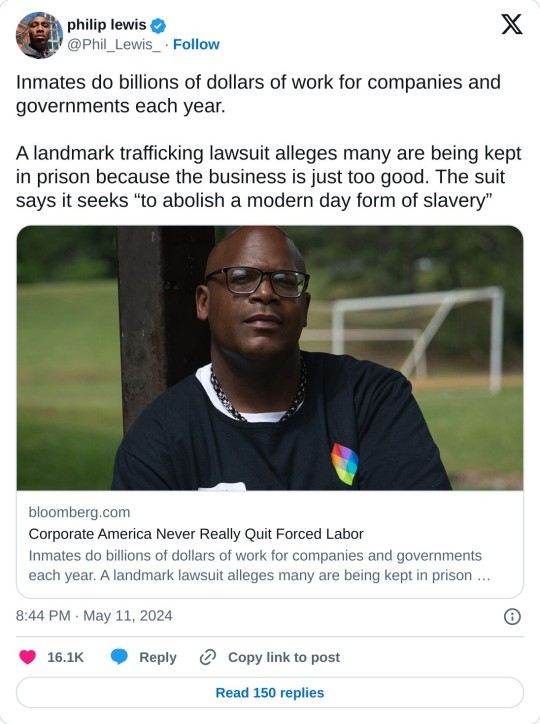
Corporate America Never Really Quit Forced Labor
Inmates do billions of dollars of work for companies and governments each year. A landmark lawsuit alleges many are being kept in prison because the business is just too good.
28K notes
·
View notes
Text
Understanding California’s Three Strikes Law: What You Need to Know

What is the Three Strikes Law?
California’s Three Strikes Law is a sentencing enhancement law that applies to individuals convicted of multiple felonies. Under this law, if you are convicted of a third felony, you can face a life sentence with a minimum of 25 years before eligibility for parole. This law aims to deter repeat offenders by imposing harsher penalties on those with previous felony convictions.
How Does the Law Affect You?
If you have two or more felony convictions on your record, a new felony conviction could trigger the Three Strikes Law. The severity of your sentence will depend on the nature of your crimes. Non-violent felonies, under certain circumstances, may also count as strikes. This law is complex and can have long-lasting effects on your future.
Defending Against Three Strikes Charges
With the right legal support, there may be options to challenge or mitigate the impact of the Three Strikes Law. Our experienced criminal defense attorneys are here to guide you through the process. We can explore potential defenses, negotiate plea deals, or work to have prior strikes removed or reduced. Each case is unique, and a tailored strategy is crucial.
Seeking Legal Help
Navigating the Three Strikes Law requires a strong understanding of the criminal defense. A skilled California criminal defense attorney can help you understand your rights and options. If you or someone you know is facing the possibility of a third strike, do not wait to seek professional help. The earlier you engage with a criminal lawyer, the better your chances of achieving a favourable outcome.
Conclusion
We know that facing the Three Strikes Law can be overwhelming. With the right guidance from a California criminal defense attorney, you can better understand your situation and take the necessary steps to protect your future. If you need help navigating this complex legal issue, contact us today. Our team is here to support you every step of the way.
0 notes
Text
Challenging Three Strikes Sentences: How a Skilled Parole Lawyer Can Help
California's "Three Strikes" law is one of the most stringent sentencing policies in the United States. It imposes severe penalties, including life imprisonment, for repeat offenders. However, changes in the law and evolving interpretations by courts have created opportunities to challenge these harsh sentences. This is where the expertise of a three strikes parole attorney becomes invaluable.
Understanding the Three Strikes Law
The Three Strikes law aims to enhance public safety by targeting repeat offenders. Under this policy, individuals convicted of three qualifying felonies face mandatory life imprisonment. While the intent of the law is to deter repeat offenses, it has also led to overly punitive sentences, even for non-violent crimes. Thankfully, legal reforms and case reviews have provided pathways for inmates to seek sentence reductions or parole.

The Role of a Three Strikes Parole Lawyer
A three strikes parole lawyer specializes in navigating the complexities of California's parole system. These legal professionals assess the specific circumstances of a case, identify errors in sentencing, and advocate for the inmate's eligibility for parole or sentence modification. By leveraging their expertise, they can argue for reduced penalties, often based on factors such as good behavior, participation in rehabilitation programs, or changes in the law.
How Legal Representation Makes a Difference
The success of challenging a three strikes sentence heavily relies on thorough preparation and an understanding of the parole process. A seasoned California parole attorney knows how to present compelling evidence and advocate for their client during parole hearings. This advocacy not only increases the likelihood of a favorable outcome but also ensures the client’s rights are upheld throughout the process.
For individuals serving life sentences under the Three Strikes law, hope lies in the expertise of skilled legal professionals. Navigating the parole system can be daunting, but with the assistance of experienced attorneys, there is a pathway toward a fairer outcome. If you or a loved one is facing this challenge, seeking the guidance of an experienced legal advocate like the team at Cal Parole Lawyer can make all the difference.
#three strikes parole lawyer#california criminal defense attorney#three strikes parole#parole lawyers in california#california criminal defense lawyers#compassionate release lawyers#criminal defense attorney#parole laws california#criminal defense lawyers#criminal defense lawyer#california youthful offender parole#criminal attorney
0 notes
Text
youtube
maya chavez saves the world (testimony) *i object your honor*
DeLeeLoo : Elon! How are you, my brother?
Elon Musk : No more brothers, DeLeeLoo.
DeLeeLoo : What do you mean? Of course we are brothers, Elon.
Elon Musk : You fucked me.
DeLeeLoo : [acting shocked] ... I did not.
Elon Musk : Yeah you did. You went behind my back, you cut me out, you fucked me.
DeLeeLoo : [after snorting line of cocaine] Well, maybe you're right. Maybe I did fuck you... a *little* bit!
[DeLeeLoo and his group all laugh]
DeLeeLoo : Yeah, I stole your California connection, so what? Who introduce you to John Deere, huh? Me. Who introduce you to your *fucking* Columbian wife? Me. WHO PROTECT YOU... when my friend Cesar wanted to slice your fucking throat? Me. Who helped you make millions and millions of dollars? Me. And what do I get in return? These... accusations. No, I have always given you everything Elon, but... that is over now!
[They all laugh again]
DeLeeLoo : So go home. Go back home. Go home and sell half grams to your fucking relatives for all I care...
[Elon Musk puts gun to DeLeeLoo's head]
DeLeeLoo : -cause you are *out*! And don't be so emotional, Elon. Cause we are brothers. We are brothers.
[Elon Musk pulls the trigger to reveal the gun was empty]
Elon Musk : Next time it's fuckin' loaded.
DeLeeLoo : [in their cell] Do you have a dream, Elon?
Elon Musk : Well, I would if I could get some fucking sleep.
DeLeeLoo : How much time do you have?
Elon Musk : Oh, let's see. Twenty-six months.
DeLeeLoo : Twenty-six months? For murder? I must meet your lawyer.
DeLeeLoo : You failed because you had the wrong dream... What do you know about cocaine?
DeLeeLoo : I need a favor from you.
Elon Musk : [voice over] The favor was to pick up fifty kilos of cocaine. Fifty. That's a hundred and ten pounds. Not exactly a small favor. Not like bumming a cigarette, for example. But what the hell. I didn't have anything better to do that day. It's not like I was on parole or anything.
DeLeeLoo : I'm very angry with you Elon, very angry with you. You don't take me to California, but, you take your bitch wife! A woman! It's you and me who started this. Hey, you and me!
Elon Musk : What do you need my connection for? What are you going to do with it?
DeLeeLoo : Nothing. It's for the principal. It's for peace of mind.
Elon Musk : Jesus fucking Christ! I ain't tellin' you. It's just business. Now, shut up! You'rer drivin' me fuckin' crazy.
DeLeeLoo : I'm driving you fuckin' crazy? You're driving me fuckin' crazy. We had a dream. What happened to our dream?
#diacritical politics#blanket term#everything's bigger in south america you're really big in south america you haven't made it anywhere until you made it here in south america
1 note
·
View note
Text
When Leslie Van Houten was first put behind bars in 1969, Richard Nixon was president, The Beatles and Marvin Gaye were at the top of the U.S. charts and computers were in their infancy.

'If you think about it, she's never used an ATM, never had a cell phone,' said her lawyer last week.
Just days later, Van Houten finally got her chance to sample such technological advances — and much more — when she was released on parole on Tuesday from a California prison.
For five decades, the former drug-addled hippy and high school 'homecoming princess' had languished in prison for her part in crimes so appalling that many Americans, including successive California governors, have insisted that none of the principal offenders should ever be released.
Now 73, Van Houten was a lonely and mentally damaged 19-year-old from suburban Los Angeles when she met crazed cult leader Charles Manson and, she has always claimed, fell completely under his malevolent spell
0 notes
Text
Kim Kardashian, Khloé Kardashian, and Dixie D'Amelio visit a California prison.
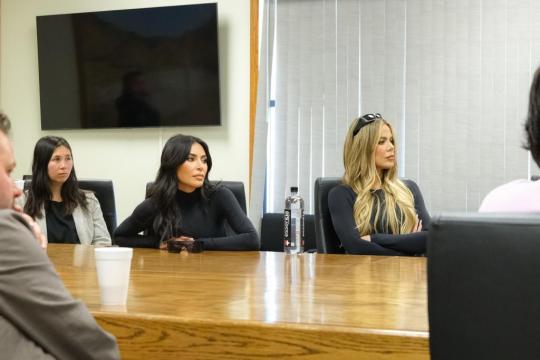
Kim Kardashian, an aspiring lawyer, paid a visit to a California state prison on Monday to learn about convicts' experiences behind bars. She traveled to Lancaster, California, with her sister Khloé Kardashian, musician Lil Baby, TikTok phenomenon Dixie D'Amelio, Fanatics billionaire Michael Rubin, and members of the Reform Alliance's newly formed Future Shapers Advisory Council for Generation Z activists. Rubin founded the Reform Alliance, a criminal justice reform organization, with Jay-Z, Meek Mill, Robert Kraft, and others. According to the organization's statement, Kim and his colleagues "met with incarcerated men in the facility to learn about their stories, hear about the challenges that led them into the criminal justice system, and identify ways in which the system can better support safety and rehabilitation." They also "toured rehabilitative programming at the facility."

Kim Kardashian, Khloé Kardashian, and Dixie D'Amelio visit a California prison.
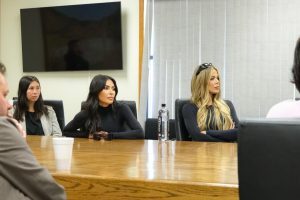
For the event, the 42-year-old Skims entrepreneur dressed down in a militaristic-looking black turtleneck sweater and black cargo pants. "It's always an honor to be able to visit the men and women living behind our prison walls," Kim said in a statement announcing the visit. Hearing the experiences of people incarcerated fuels my desire to campaign for reform and discover ways to use my platform to help alter lives and laws." "Today, I was especially excited to bring Reform's Future Shapers Advisory Council inside the prison," she continued. We are preparing the next generation of leaders and influencers to fight alongside us."
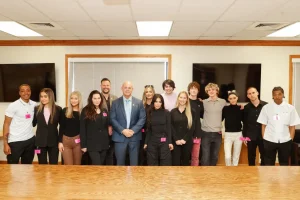
Future Shapers Advisory Council members Hannah Jackson, Rondo Bonilla, Sophia Kianni, Zander Moricz, Jack Wright, Heidi D'Amelio, Marc D'Amelio, and Aidan Kohn-Murphy were also in attendance, as were Reform Alliance executives Jessica Jackson and Erin Haney. Dixie, 21, is also a member of the council. Kim and Rubin came up with the idea for the new council after hosting a Reform Alliance dinner earlier this year. Kim told Vogue last year that she hopes to start a thriving law business after passing California's "baby bar," also known as the First-Year Law Students' Examination.

She'd failed it three times before, as evidenced by her reality TV show. Kim visited the White House multiple times during the Trump administration to discuss criminal justice reform. She also persuaded the then-President to pardon Alice Marie Johnson, who was serving a life sentence without the possibility of parole for a nonviolent narcotics charge. Kim's late father, Robert Kardashian, was a defense attorney during O.J. Simpson's murder trial in 1995. Read the full article
0 notes
Text
A California appeals court tossed a reputed gang member’s murder conviction, ruling that prosecutors unfairly used a rap video as evidence and citing a new state law that curbs such practice.
Travon Rashad Venable, 34, remains at Calipatria State Prison pending possible review by the state's high court or a potential retrial for his role in the March 5, 2014, slaying of Enon “Bubba” Edwards, who was shot in the head.
Venable was convicted of first degree murder, after prosecutors said he was behind the wheel of the drive-by shooting near Medical Center Drive and West Union Street in San Bernardino, which is about 60 miles east of downtown Los Angeles.
Jurors were showed a YouTube rap video that featured Venable’s younger brother, “Young Trocc" and included appearances by Venable and other members of California Gardens Crips gang, court records showed.
"They could be seen flashing gang signs and displayed guns, drugs, and money," according to the state's Fourth Appellate Division ruling issued on Feb. 17.
"At one point, Venable held a rifle with an extended magazine. One of the lines in the rap was: 'Got word from a bird[] that they did that [racial slur] dead wrong/Slid up Medical and left that [racial slur] head gone.' ”
A gang expert testified that the video showed that "a California Gardens member shot someone else in the head on Medical Center" and that the group was “claiming ownership” of the slaying, the court said.
California Gov. Gavin Newsom this past fall signed into law restrictions on how prosecutors could use such music in their cases.
Rappers Killer Mike, Meek Mill, Too $hort, Ty Dolla $ign, YG, E-40 and Tyga were at a virtual bill signing ceremony to support Newsom's action.
"There’s no question the trial judge’s admission of the rap evidence in this case did not comply with the new requirements for admission of creative expression," the appeals court said.
"There’s also substantial concern that admitting the evidence may have had the precise effects the Legislature sought to avoid. The rap video contains offensive language, including frequent uses of the n-word, depictions of guns and drugs, and references to violent gang activities. Most of the people who appear in the video are young Black men."
This could the first time a conviction could be erased due to that new state law.
"As far as I know this is the first published appellate decision addressing this new state law," Venable's attorney Joshua Siegel said in a statement to NBC News on Friday.
Venable had been sentenced to 129 years to life behind bars, according to the appears court. State prison record show he would have been eligible for parole as soon as October of 2048.
Reps for the San Bernardino County District Attorney's Office, San Bernardino Police Department and California Attorney General's Office could not be immediately reached for comment on Friday morning.
Venable’s attorney said his client is aware of the ruling but the lawyer declined any further comment.
#Rap#Court#Music Videos#Trials#California#California appeals court tosses murder conviction#citing prejudicial rap video#Travon Rashad Venable
0 notes
Text
The Los Angeles Innocence Project has taken up the notorious case of convicted wife killer Scott Peterson in new court filings, ABC News was first to report on Thursday. The group is seeking new evidence from the original trial.
Laci Peterson, who was 27 years old and eight months pregnant, disappeared on Christmas Eve in 2002. Her body was found in San Francisco Bay in April 2003.
Scott Peterson, 51, was arrested and charged with first-degree murder in the death of his wife and second-degree murder in the death of their unborn son. He was convicted in 2004 and sentenced to death in 2005. He was later sentenced to life in prison without parole.
Attorneys with the LA Innocence Project claimed that Scott Peterson's state and federal constitutional rights were violated, including a "claim of actual innocence that is supported by newly discovered evidence," according to the court filings.
"New evidence now supports Mr. Peterson's longstanding claim of innocence and raises many questions into who abducted and killed Laci and Conner Peterson," the filings state.
His attorneys are seeking dozens of items they say they could not locate after reviewing the trial files from his prior counsel "after a thorough search," according to the filings. The items include evidence from the investigations into a December 2002 burglary of a home across the street from the Petersons' in Modesto in Stanislaus County, Laci Peterson's missing Croton watch, and a van fire in the Airport District on Dec. 25, 2002, according to the filings. They are also seeking documents from interviews with several witnesses.
Paula Mitchell, the director of the LA Innocence Project, said she found "deficiencies" while reviewing the discovery of Scott Peterson's case and sent a letter to Stanislaus County District Attorney Jeff Laugero on Nov. 14, 2023, "seeking informal production of numerous specific items of post-conviction discovery," according to a declaration included in the filings.
The letter "includes private identifying information concerning numerous citizens, potential material witnesses, and possible suspects -- as well as sensitive investigative leads relating to Mr. Peterson's claim of innocence-information that was referenced throughout various police reports, tip sheets, and other investigative materials from both the prosecution and the defense that I reviewed," she said in her declaration.
Mitchell also said during her investigation, she has come across "numerous witnesses" who have expressed hesitation or "outright unwillingness" to provide information due to the high-profile nature of the case.
Scott Peterson, who pleaded not guilty, has maintained his innocence and claimed he received an unfair trial based on possible jury misconduct. His lawyers have previously claimed that a woman, known as Juror 7, had not disclosed involvement in other legal proceedings.
In 2020, the California Supreme Court overturned Scott Peterson's death sentence, citing that his jury was improperly screened for bias against the death penalty, according to court documents.
He was resentenced to life in prison without the possibility of parole in December 2021 and moved off death row in October 2022.
In December 2022, Superior Court Judge Anne-Christine Massullo denied Scott Peterson "relief" in his appeal based on stealth juror accusations.
Scott Peterson's attorney, Pat Harris, said in a statement to ABC News on Thursday that they are "thrilled to have the incredibly skilled attorneys at the LA Innocence project and their expertise becoming involved in the efforts to prove Scott's innocence."
The LA Innocence Project -- which provides pro bono legal services to people incarcerated in Central and Southern California who may have been wrongfully convicted -- said in a statement later on Thursday that it is representing Scott Peterson and "investigating his claim of actual innocence."
"We have no further comment at this time," the organization said.
Mike Belmessieri, who served as a juror in Scott Peterson's trial, told ABC News on Thursday that there isn't a day that goes by where he hasn't thought about the case. He said he supports the LA Innocence Project's review of the case.
"If they think they're going to find something different, that sheds light on something new, I fully support it," Belmessieri said.
3 notes
·
View notes